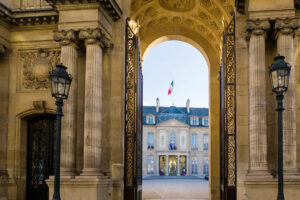PARIS — The leaders of France and Germany sought at a summit on Sunday to pave over divisions that have dogged Europe’s closest bilateral relation since the war in Ukraine broke out, leaving many of their most vexed issues to be worked out later.
In a show of pageantry and unity, the two governments marked the 60th anniversary of a friendship treaty signed by France’s Charles de Gaulle and Germany’s Konrad Adenauer with speeches at the Sorbonne University in Paris and a joint cabinet meeting at the Elysee Palace.
The summit between the two governments, traditionally the driving force behind broader EU policy initiatives, had originally been planned for October, but was postponed amid differences on issues ranging from energy policy to defense procurement.
“The Franco-German motor is a compromise machine — well oiled, but sometimes loud and needing hard work,” German Chancellor Olaf Scholz said in a speech at the Sorbonne.
The two governments issued a joint statement flagging plans to press ahead with joint initiatives for a main battle tank, in space programs, and in developing hydrogen production and battery technologies.
But they also papered over deeper differences.
French President Emmanuel Macron said the two countries agreed the European Union (EU) needed to find funds to make green investments in the industrial sector in response to US subsidies for green energy under Washington’s $369 billion Inflation Reduction Act (IRA).
“We have a real convergence in the responses we are bringing,” Mr. Macron said at a news conference with Mr. Scholz, but offered no concrete details.
German officials say Berlin sees little need for a new sovereign EU fund that France considers necessary to help European industry make investments to remain competitive against US firms benefiting from generous tax credits under the IRA.
The two governments also committed only vaguely to work on an EU overhaul of the electricity market, on which France wants urgent progress as it prepares a vast nuclear energy push while Berlin is skeptical and does not want to rush into.
Meanwhile, on defense, Mr. Macron opened the door to French involvement in plans between Germany and more than a dozen other European countries to pool air defense capabilities, saying Paris would weigh risks and possible investments in the “coming weeks and months.” — Reuters

